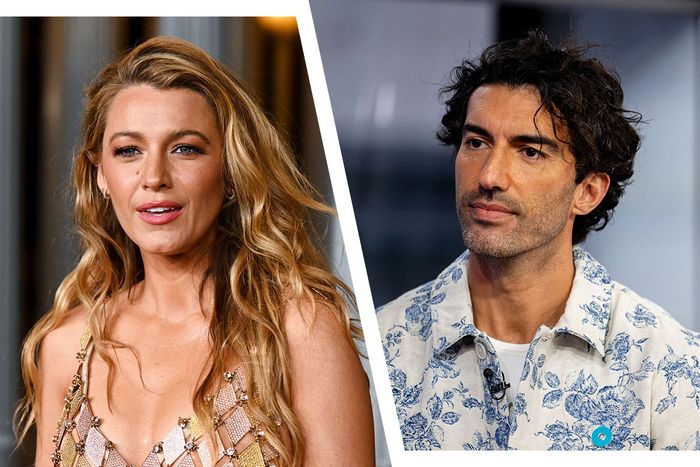
Justin Baldoni sued Blake Lively, Ryan Reynolds, and their press rep on Thursday, January 16, alleging that they defamed him by claiming publicly that he mistreated Lively on the set of It Ends With Us. Lively, Reynolds, and their spokesperson, Leslie Sloane, “made one or more statements to persons … including without limitation to the New York Times, to the effect that [he] engaged in, permitted, and/or failed to prevent sexually inappropriate conduct toward Lively and others,” Baldoni’s suit claims. Baldoni, who is joined in the suit by his reps Melissa Nathan and Jennifer Abel, also allege that team Lively’s claims about retaliation were “propagating false and misleading narratives about Lively for the purpose of damaging her image and reputation.”
Baldoni’s lawsuit is the latest chapter in a legal battle that started unfolding on December 21, when the New York Times published a bombshell exposé detailing Lively’s claims against her It Ends With Us co-star Baldoni over alleged mistreatment while filming. This story referred to Lively’s complaint with California’s Civil Rights Department — which sets the stage for a possible labor lawsuit against Baldoni — and also claimed that his crisis PR team had worked to tank the Gossip Girl alum’s reputation. The alleged reason? Per the Times, Baldoni (also the film’s director and writer) and his camp feared that Lively’s complaints about inappropriate sexual comments would surface — and they needed to strike preemptively. Baldoni sued the Times for libel on December 31, claiming that its reporters relied on “cherry-picked” information and they “altered communications stripped of necessary context and deliberately spliced to mislead.”
As for Lively’s allegations, Baldoni’s legal team reportedly said, “These claims are completely false, outrageous and intentionally salacious with an intent to publicly hurt and rehash a narrative in the media.” The New Year’s Eve news dump continued when Lively filed a lawsuit against Baldoni and members of his PR team in Manhattan federal court. Among Lively’s legal claims: sexual harassment and intentional infliction of emotional distress. Days prior, Stephanie Jones, who had done press for Baldoni, filed her own lawsuit in Manhattan against Baldoni and his reps, Nathan and Abel. She alleged in her December 24 lawsuit that they “secretly coordinated” to launch the smear campaign against Lively. Her legal team said this lawsuit was “a necessary step to stop defendants’ continuing misconduct and for Steph to recover the reputation she has worked decades to establish and which the defendants disparaged for their own nefarious purposes.”
These unfolding disputes are all the more prescient given other recent high-profile defamation cases: E. Jean Carroll won a total of $83.3 million in her January 2024 defamation damages trial against Donald Trump, after winning $5 million for sexual abuse and defamation one year prior. Two Georgia poll workers won $148 million in their defamation trial against Giuliani. YouTuber Tasha K. owes Cardi B almost $4 million for defamation. And, of course, Johnny Depp won $15 million in damages against ex Amber Heard, though he owed her $2 million in a competing defamation claim. The dispute has also hearkened back to Me Too discourse. Some observers of the Lively-Baldoni drama believe that the actress suffered from gender-based mistreatment — and institutional unwillingness to hold those in power (such as directors and producers) to account. Others have seen the unfolding disputes as little more than workplace drama involving big personalities with high financial stakes.
So do we have another Depp v. Heard on our hands? A few of the most plausible scenarios, according to crisis communications and legal experts, for how it all ends.
Scenario one: It’s a stalemate.
Juda Engelmayer, the PR and crisis-response veteran whose clients include Harvey Weinstein, said he doesn’t think anyone is winning so far. The actual legal complaints are at their very preliminary stages, so the court we’re hearing from right now is the court of public opinion. “I think it’s a stalemate,” Engelmayer said. “There are people who support Justin’s side, there are people who support Blake Lively’s side — and I don’t think anyone’s really analyzed the data.” Calling it a “popularity contest” at this point, he added that “there are people who are inclined to support the woman, and there are people angry that anytime a woman says something, [they feel] it’s believed.”
Scenario two: All lawsuits are settled.
Two huge celebrities battling it out in court over on-set drama? It would be a fun season four of Ryan Murphy’s Feud, but Tre Lovell, a longtime attorney in Los Angeles, does not foresee this becoming a courtroom spectacle.
“The cases between Lively and Baldoni are going to settle for sure. It benefits neither one of them to be in litigation for the next two years. The most important thing is the publicity, the lawsuits are second.” Lovell explained, “The most important thing to each of them is their brand, their name, their livelihood, and getting work.” For Lovell, the cases “in many ways are supporting the PR and what’s going to happen — and what we’re seeing now — is a big explosion from each side.”
Barrelling toward trial has major risks. Both sides would have to file more documents publicly for each of them to protect their own reputations.
“They want to get their side out. They want to restore their image. They want to protect their brand. And once again, once the stories are out there, neither will benefit from keeping this in the court system for the next two years,” Lovell said. “You go through the case, you do depositions, that testimony gets leaked, written discovery gets leaked — it never goes away, it’s just impugning their brand.”
Scenario three: Lively and Baldoni go to trial.
The vast majority of lawsuits settle, but settlement only happens if all sides agree. So far, these sides do not see eye to eye. “This case reminds me a lot of the Depp-Heard case. In a typical case, I’d say there’d be a 99 percent chance of settlement before trial, and that’s because trial is a big risk that’s extremely costly, [and] it takes several years to get to,” attorney Camron Dowlatshahi of MSD Lawyers, specializing in sexual-harassment proceedings, said.
But “in this case, there’s a much higher chance, because you have two high-profile people who are very emotionally charged who have money, and money doesn’t seem to be the motivating factor.” The “only” motivating factor seems to be reputational repair. “The only way that really happens is through a public trial, because a settlement is typically confidential: What leads to it, and what leads both sides to ultimately resolve their dispute, is typically not fully out in the public.”
Scenario four: Lively wins.
Baldoni is not as famous as Lively. If you didn’t see the movie, then you might have not had any idea who he was until the legal drama surfaced. (Guilty as charged!) This could make Baldoni’s efforts more challenging for him. “Who does the jury believe more — Ms. Lively or Mr. Baldoni? The case will come down to a heavily scrutinized credibility determination by the jury. There will be a lot of transparency in the lawsuit and there will be a fight on whether and to what extent the press will be allowed in the courtroom at appearances and at trial,” Kimberly C. Lau, chair of the Title IX and education practice group at Offit Kurman, said.
“Whether the celebrity is popular (or conversely, unpopular or less well-known) will have an impact on the public’s perception of the case,” Lau continued. “Popular celebrities will naturally garner more public support with a less critical eye. People don’t want to believe that their favorite star is capable of bad behavior. The same is true for their counsel. How their lawyers carry themselves in and out of the courtroom will play an important role in the public’s perception of the celebrity-litigant.”
“As alleged in Ms. Lively’s complaint, and as we will prove in litigation, Wayfarer and its associates engaged in unlawful, retaliatory astroturfing against Ms. Lively for simply trying to protect herself and others on a film set,” Lively’s representatives stated. “And their response to the lawsuit has been to launch more attacks against Ms. Lively since her filing.”
Scenario five: The New York Times defends itself.
Generally, for public figures such as Baldoni, a successful defamation claim would need to show that an outlet knew what they were publishing was false and ran with it anyway. So if the Times were given incomplete information or outright misled — like with out-of-context or incomplete texts — but did its best to report out and fact-check and seek comment, then the paper wouldn’t be on the hook. California also has a law on the books that further insulates people against defamation claims, making proof of actual malice even more important. Roy S. Gutterman, director of the Newhouse School’s Tully Center for Free Speech at Syracuse University, thinks Baldoni’s claims against the Times are meant to deter reporting.
“The lawsuit against the New York Times certainly appears to be an effort to punish the media for doing its job and reporting on a highly public matter of public interest,” Gutterman said in an email. He also noted, “Suing the press like [this] sends a message to other news organizations, too. But just because you do not like the news story does not mean it is false and defamatory. This certainly looks like it’s aimed at chilling, intimidating and punishing the press.” For its part, the Times responded to Baldoni’s suit, saying, “We plan to vigorously defend against the lawsuit. The role of an independent news organization is to follow the facts where they lead. Our story was meticulously and responsibly reported. It was based on a review of thousands of pages of original documents, including the text messages and emails that we quote accurately and at length in the article.” The Times also said that it shared information it intended to publish with Baldoni’s team — including texts and documents — and tell them whether there were any inaccuracies or missing context. The Times said, “We plan to vigorously defend against the lawsuit.”


